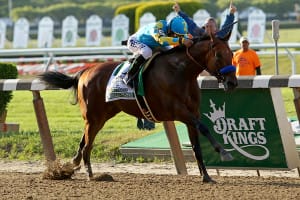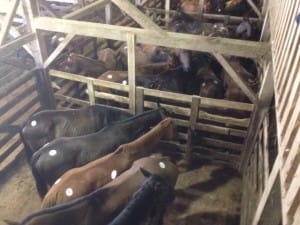
American Pharoah strides clear in the final leg of the Triple Crown, the Belmont Stakes.
Photo Credit: Jessie Holmes/Equisport Photos
The following is based on a telephone conversation I had with Ahmed Zayat, owner of Triple Crown winner American Pharoah, on Tuesday, July 28.
American Pharoah begins the second part of his three-year-old season in the Haskell Invitational Stakes on Sunday at Monmouth Park.
AB: What is it like to own an American treasure.
AZ: American Pharoah is a blessing, a special horse, a sweet horse. He is a one-in-a-lifetime horse. It is an unbelievable privilege. We bred him as well as own him; we did it the hard way as [Bob] Baffert [his trainer] would say, breeding him.
He is America’s horse, we’ve waited for this horse to bring us hope. He is everybody’s horse now. We own him, we are his custodians. It is a responsibility. I feel a sense of responsibility to share him, to share him with the public. He belongs to everyone now, he is a Triple Crown winner. We have to be extremely careful what with we do next.
American Pharoah has won 5 Grade 1 races, on different tracks, in different conditions.
He is carrying his flesh well. When considering his next race, we can see how is he traveling. He is a great horse, but the horse always comes first.
We have to be careful not to tarnish the Triple Crown. We are not scared of racing him, but it is a balancing act. He enjoys his training, he enjoys his racing, he is a happy horse. We won’t race him unless we know he is ready, and really fit. But we know that things can happen in a race; Secretariat was beaten by Onion at Saratoga, it does happens. But as long as he is happy and healthy we will race him.
I am a fan before being an owner. I am a student of the game. Things happen in racing. Small fields, you become the target, but we cannot worry about that. I cannot micromanage the race. As long as he is happy, healthy and fit, in that order, we will keep racing.
He did some incredible things in this year’s Triple Crown, beating larger fields than in the past. He has won at seven furlongs up to a mile and a half in his career. He has won on the polytrack, and all kinds of dirt surfaces.
AB: Is it about the horse or you?
AZ: This is all about American Pharoah. I am just a person, a very lucky person. We have been gifted with a beautiful horse, it is just a beautiful gift. But it is all about American Pharoah. Its about the athlete, I love horses, I just do.
Not long ago I was laying down in his stall, he is a 1200 pound animal. Baffert was nervous. I told Victor [Espinoza] to come in a lay down with us. Pharoah is really smart, just licking me, I guess he loves the cologne.
I am the ambassador of this horse.
AB: Does he compare to Secretariat?
AZ: No, no. No one ever.
We all remember the “tremendous machine”. Winning the Belmont by 31 lengths, in a little over a canter, it was incredible.
American Pharoah is American Pharoah, Pharoah is royalty. How will he stand in history? His Belmont was a very respectable time, his last quarter was fast, but it is all hard to compare, but of course I am a bit biased.
I was about 10 when Secretariat won, I have watched it. We all remember the images. But I will tell you, the roar of the crowd [when American Pharoah won], 90,000 people, hugging, kissing, happy, screaming, it was an incredible moment. It was a mad house, NYRA security was around — it was a mad house, everything was so spontaneous, crazy elation and lots of sheer happiness, incredible, a celebration of joy.
AB: Decision to sell his breeding rights.
AZ: It was not a difficult decision. Every stallion I have had, since 2006, it is now 14 stallions. People in Kentucky call me a stallion maker, Pioneerofthe Nile, Paynter, Bodemeister and so forth.
I am used to making stallion deals, but I always keep a portion, whether it is 25% or 75% as with Pharoah’s father, Pioneerofthe Nile. I never sell 100%. It provides me access. I like to go to the barns and visit. I would like to breed to him. I am still in control of American Pharoah while he races, and when he retires I will still have a portion.
AB: Does the champ have a barn name?
AZ: There is no real pet name for American Pharoah. Some people call him “the Pharoah”, others call him “AP”. Different people call him something different.
AB: If you could change something in racing, what would it be?
AZ: The Biggest thing is we need the fans of the sport, and what is a sport without transparency. And transparency should not be a buzzword, it needs to be operational. The disclosure of medical records for example.
We need to bring fans into the action. We need to be open. We can use social media, more open communications. That’s how American Pharoah got his name. We try to open up our barn so fans can come and see him. I think this is very important.
We are also looking at the use of lasix with a research project in Gulfstream Park. it is a scientific study, privately funded, looking at lasix-free races versus lasix races. We are funding it, we want hard data. We have commissioned one of the foremost vets to undertake the study. Gulfstream Park is providing us all the access and support.
AB: Thanks for your time.
AZ: Thanks for the coverage you helped provide with Paynter.

